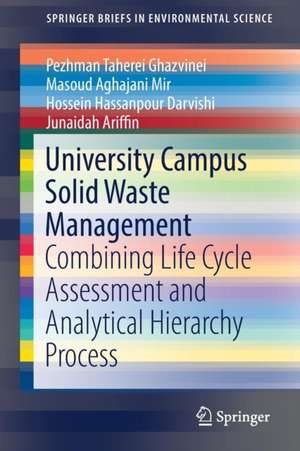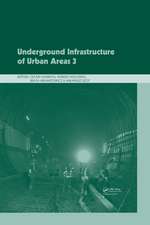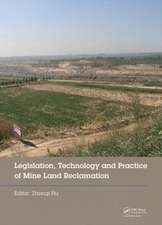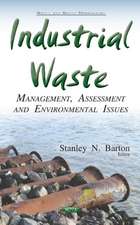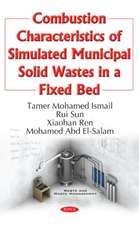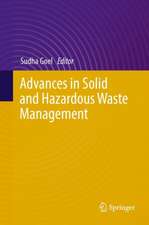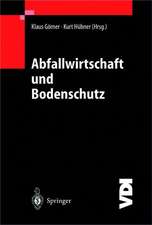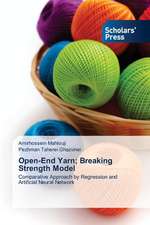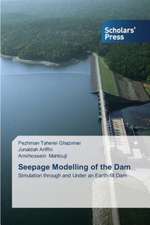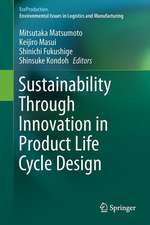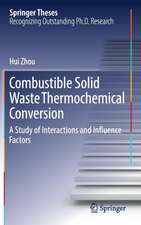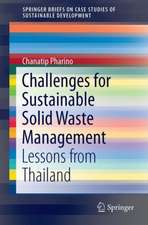University Campus Solid Waste Management: Combining Life Cycle Assessment and Analytical Hierarchy Process: SpringerBriefs in Environmental Science
Autor Pezhman Taherei Ghazvinei, Masoud Aghajani Mir, Hossein Hassanpour Darvishi, Junaidah Ariffinen Limba Engleză Paperback – 8 aug 2017
This volume provides a comprehensive method for optimizing solid waste management practices and procedures at college and university campuses through the use of cluster analysis to combine Life Cycle Assessment and Analytical Hierarchy Process. Author Pezhman Taherei uses Malaysia’s University of Malaya as a case study and model, and through this method was able to assess which combination of waste disposal, management, and recycling techniques generate the least environmental impact while retaining the maximum cost savings for the university. A method for analysis of solid waste composition is also proposed.
Higher education institutes generate thousands of tons of solid waste per year. Comprehensive solid waste management programs, which take integrated solid waste management systems into consideration, are one of the greatest challenges to achieving campus sustainability. This system can serve as a guide and blueprint for other universities that are taking steps toward sustainability through improved solid waste management.
Din seria SpringerBriefs in Environmental Science
-
 Preț: 348.77 lei
Preț: 348.77 lei -
 Preț: 382.57 lei
Preț: 382.57 lei -
 Preț: 378.12 lei
Preț: 378.12 lei -
 Preț: 378.80 lei
Preț: 378.80 lei -
 Preț: 381.98 lei
Preț: 381.98 lei -
 Preț: 347.80 lei
Preț: 347.80 lei - 15%
 Preț: 464.18 lei
Preț: 464.18 lei -
 Preț: 378.12 lei
Preț: 378.12 lei -
 Preț: 377.53 lei
Preț: 377.53 lei -
 Preț: 379.09 lei
Preț: 379.09 lei -
 Preț: 381.00 lei
Preț: 381.00 lei -
 Preț: 383.93 lei
Preț: 383.93 lei -
 Preț: 175.58 lei
Preț: 175.58 lei -
 Preț: 475.83 lei
Preț: 475.83 lei -
 Preț: 380.07 lei
Preț: 380.07 lei -
 Preț: 378.92 lei
Preț: 378.92 lei -
 Preț: 411.93 lei
Preț: 411.93 lei -
 Preț: 375.62 lei
Preț: 375.62 lei -
 Preț: 375.45 lei
Preț: 375.45 lei -
 Preț: 378.92 lei
Preț: 378.92 lei -
 Preț: 377.57 lei
Preț: 377.57 lei -
 Preț: 377.35 lei
Preț: 377.35 lei -
 Preț: 378.34 lei
Preț: 378.34 lei -
 Preț: 344.67 lei
Preț: 344.67 lei -
 Preț: 374.30 lei
Preț: 374.30 lei -
 Preț: 362.43 lei
Preț: 362.43 lei -
 Preț: 446.26 lei
Preț: 446.26 lei - 5%
 Preț: 361.96 lei
Preț: 361.96 lei -
 Preț: 376.43 lei
Preț: 376.43 lei -
 Preț: 380.63 lei
Preț: 380.63 lei -
 Preț: 375.84 lei
Preț: 375.84 lei - 15%
 Preț: 463.20 lei
Preț: 463.20 lei -
 Preț: 383.33 lei
Preț: 383.33 lei -
 Preț: 375.23 lei
Preț: 375.23 lei -
 Preț: 377.57 lei
Preț: 377.57 lei -
 Preț: 381.59 lei
Preț: 381.59 lei -
 Preț: 379.48 lei
Preț: 379.48 lei -
 Preț: 376.04 lei
Preț: 376.04 lei -
 Preț: 413.84 lei
Preț: 413.84 lei -
 Preț: 381.81 lei
Preț: 381.81 lei -
 Preț: 352.28 lei
Preț: 352.28 lei -
 Preț: 381.81 lei
Preț: 381.81 lei -
 Preț: 381.98 lei
Preț: 381.98 lei - 5%
 Preț: 331.65 lei
Preț: 331.65 lei -
 Preț: 375.62 lei
Preț: 375.62 lei -
 Preț: 377.95 lei
Preț: 377.95 lei -
 Preț: 413.45 lei
Preț: 413.45 lei -
 Preț: 267.19 lei
Preț: 267.19 lei -
 Preț: 373.73 lei
Preț: 373.73 lei -
 Preț: 375.62 lei
Preț: 375.62 lei
Preț: 378.71 lei
Nou
Puncte Express: 568
Preț estimativ în valută:
72.46€ • 75.67$ • 59.84£
72.46€ • 75.67$ • 59.84£
Carte tipărită la comandă
Livrare economică 15-29 aprilie
Preluare comenzi: 021 569.72.76
Specificații
ISBN-13: 9783319432274
ISBN-10: 3319432273
Pagini: 175
Ilustrații: XVI, 114 p. 44 illus., 39 illus. in color.
Dimensiuni: 155 x 235 mm
Greutate: 0.2 kg
Ediția:1st ed. 2017
Editura: Springer International Publishing
Colecția Springer
Seria SpringerBriefs in Environmental Science
Locul publicării:Cham, Switzerland
ISBN-10: 3319432273
Pagini: 175
Ilustrații: XVI, 114 p. 44 illus., 39 illus. in color.
Dimensiuni: 155 x 235 mm
Greutate: 0.2 kg
Ediția:1st ed. 2017
Editura: Springer International Publishing
Colecția Springer
Seria SpringerBriefs in Environmental Science
Locul publicării:Cham, Switzerland
Cuprins
Chapter 1. Introduction 1.1 Challenges of Solid waste management 1.2 Solid waste generation 1.3 Approach of the book.- Chapter 2 Overview of Solid Waste Management 2.1 Pilot campus 2.2 The consequences of population expansion and solid waste generation trends 2.3 Sustainable concept at Higher Education Institutes (HEIs) 2.4 Solid waste minimization and recycling experiences at universities’campus.- Chapter 3. Solid Waste Management Models 3.1 Life Cycle Assessment 3.2 Application of analytical hierarchy process in municipal solid waste management 3.3 Cluster analysis for solid waste management methods 3.4 Requirements of solid waste management.- Chapter 4. Solid Waste Management Design 4.1 Overview of solid waste management plan 4.2 Current solid waste management at the campus 4.3 Improving solid waste management at the campus 4.4 Data resources of the investigation 4.5 Stage 1: Solid waste generation and composition of the campus 4.6 Stage 2: Solid waste management scenarios 4.7 Stage 3: Environmental assessment of scenarios by life cycle assessment 4.8 Stage 4: Economic analysis of the scenarios by analytical hierarchy process 4.9 Stage 5: Combining LCA and AHP using Cluster Analysis method 4.10 Plan Summary.- Chapter 5: Waste Composition Investigation 5.1 Overview of waste composition investigation 5.2 Stage 1: Solid waste generation and composition5.3 Stage 2: Introducing scenarios for solid waste management5.4 Stage 3: Life cycle assessment of different solid waste management scenarios 5.5 Stage 4: Analytical hierarchy process of solid waste management scenarios 5.6 Stage 5: Combination of LCA and AHP.- Chapter 6: Solid Waste Management Framework: 6.1 Structure of the proposed solid waste management framework 6.2 Comparison of the results between AHP and cluster analysis method 6.3 Combination of LCA and environmental results of AHP 6.4 Advantages of the proposed solid waste management system 6.5 Environmental advantages of proposed solid waste management system at the campus 6.6 Comparison of the current investigation with relevant investigations.- Chapter 7. Summary and limitations of recommendations.
Notă biografică
Dr. Pezhman Taherei serves as a Postdoctoral Researcher in the Department of Civil Engineering at Malaysia's University of Malaya.
Caracteristici
Provides an innovative method for combining Life Cycle Assessment and Analytical Hierarchy Process for optimal results in solid waste management Introduces a comprehensive methodology for evaluating solid waste composition and determining the waste management option most appropriate to different scenarios Utilizes a large Malaysian university as a lab and case study for these approaches
